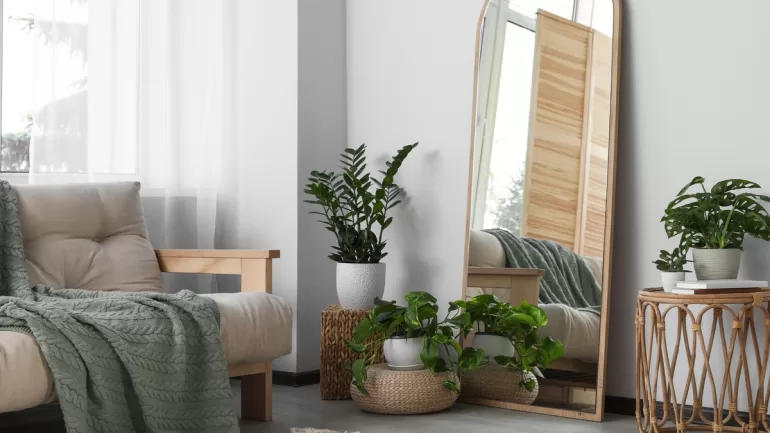LIFESTYLE
Want a bigger-looking home? These design choices make homes feel more spacious using light, mirrors, and smart décor. Perfect for small spaces.
BY EMMA BADEBAUGH, ARTCENTRON
The Best Design Choices That Make Homes Feel More Spacious
The illusion of space is a powerful tool in interior design. Cramped quarters can feel liberating, and average-sized rooms can transform into expansive-feeling sanctuaries with a few strategic moves. It’s not about magic, but rather a clever application of design principles. The right design choices that make homes feel more spacious can dramatically improve a home’s atmosphere and functionality. Let’s look at some practical ways to achieve this effect.
Let There Be Light
First, maximizing natural and artificial light is fundamental. Dark corners recede and make a room feel smaller, while well-lit spaces appear open and airy. Swap heavy, dark draperies for sheer curtains or blinds that allow sunlight to pour in.
Then, consider your lighting fixtures. Instead of a single overhead light, a layered lighting plan with floor, table, and wall lamps can illuminate the entire room, eliminating shadows and creating a sense of depth.
The Magic of Mirrors
Mirrors are a classic trick for a reason: they work. Placing a large mirror on a wall can visually double the size of a room. It reflects both light and the view, creating an illusion of more square footage.
For a dramatic effect, try placing a mirror opposite a window. This brightens the space but also brings a sense of the outdoors inside, further blurring the lines of the room.
Color Your World Bigger
Next, paint color has a profound impact on spatial perception. Light, neutral colors are your best friends when trying to make a room feel larger. Shades of white, cream, pale gray, and soft pastels reflect light, making walls recede.
This doesn’t mean you must live in a monochrome world. Painting the wall trim and moldings a slightly lighter shade than the walls can add to the illusion of height and space. In the kitchen, this approach works well; many homeowners find that understanding the dos and don’ts of styling white kitchen cabinets is key to creating a bright, open cooking area.
Choose Furniture Wisely
Bulky, heavy furniture can devour a room’s floor space. Instead, go for pieces with a lighter visual weight. Furniture with exposed legs, like armchairs or dining tables, allows you to see the floor beneath, creating an unbroken sightline and a feeling of openness.
Plus, multifunctional furniture, such as an ottoman with hidden storage or a coffee table with shelves, helps reduce clutter, a major space-killer.
Keep It Cohesive
A unified design scheme helps a space feel harmonious and uncluttered. Stick to a limited color palette and use consistent materials throughout the room.
A chaotic mix of styles and colors can make a space feel busy and smaller than it is. Keeping the flooring consistent from room to room also helps create a seamless flow, making the entire home feel more expansive.
You don’t need to undergo a massive renovation. Your home simply demands thoughtful attention to detail and a few clever visual tricks. The adjustments we’ve discussed can have an outsized impact on how a room feels. Implementing these design choices that make homes feel more spacious can transform any area into a more open, inviting, and comfortable environment.
